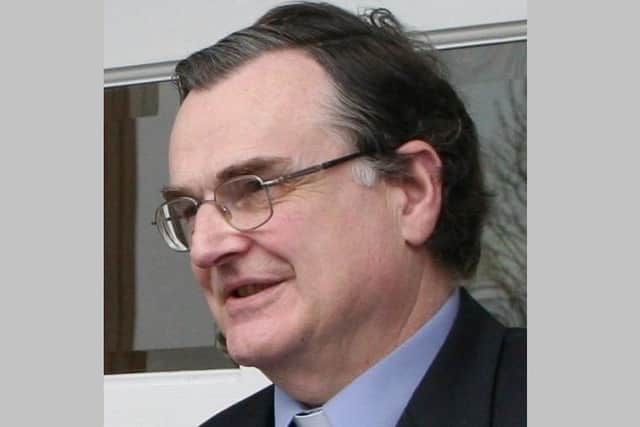Ian Ellis: As the arrest of American journalist Evan Gershkovich in Putin's Russia goes to show, a free press is to be highly valued and never taken for granted


Mr Gershkovich, who works for the Wall Street Journal (WSJ), faces espionage charges which have been flatly denied. He is now the first US journalist to have been detained in Russia on such charges since the Cold War.
Far from being unaware of the dangers involved in honest reporting in Russia, he tweeted last July that the work had become also “a regular practice of watching people you know get locked away for years”.
Advertisement
Hide AdAdvertisement
Hide AdPjotr Sauer, a Russian affairs reporter for The Guardian newspaper, has declared that just as for years “Evan did everything he could to tell the story of modern Russia”, so now the light has to be kept shining on him.


Having been denied bail, Mr Gershkovich faces incarceration in Moscow's notorious Lefortovo prison at least until the next court hearing understood to be scheduled for the end of May. Every journalist and every person who values the free press must be profoundly concerned.
Mr Gershkovich is the son of Jewish exiles from the former Soviet Union who met in New York and settled in Princeton, New Jersey. The Jewish Chronicle has reported that his grandmother, after hearing rumours that Soviet Jews were being deported to Siberia, fled the Soviet Union with his mother, Ella, then 22. The report indicated that Mr Gershkovich's father, Mikhail, left the Soviet Union as part of the same Jewish migration wave.
With both parents having a Jewish-Russian background, he and his sister, Danielle, were both brought up to know Russian traditions and the Russian language. That linguistic knowledge and cultural familiarity naturally were ideal for reporting from Russia. His parents told how their son's love for Russia grew as he worked there and how, despite what has happened, he still loves the Russian people.
Advertisement
Hide AdAdvertisement
Hide AdHis mother said that she felt an article by her son about Vladimir Putin, published in the WSJ last December, caused her to worry. However, in a letter sent to his parents after his March 29th arrest he displayed a positive attitude and said he was not losing hope.
The arrest took place in the city of Yekaterinburg, approximately 1,100 miles east of Moscow where Mr Gershkovich was brought by authorities.
In the United States, the leaders of the United Church of Christ, a mainline Protestant denomination, paid tribute to him: “Evan is just 31 and already an esteemed, distinguished journalist who has sought to keep the world well-informed during a particularly troubled period.” The denomination's leaders called for Mr Gershkovich's release from Lefortovo prison, adding: “May God’s presence, even there, strengthen and protect Evan until we can bring him home.”
On the day after the arrest, White House press secretary Karine Jean-Pierre said the US State Department had been in direct touch with the Russian government on the matter. She added that the Department condemned the Russian government’s continued targeting and repression of journalists and freedom of the press.
Advertisement
Hide AdAdvertisement
Hide AdWriting in the WSJ since Evan Gershkovich's detention, reporter Matthew Luxmoore has pointed out that the Russian state's campaign against free media “accelerated after 2014, when Russia annexed Ukraine’s Crimean Peninsula and attacked eastern Ukraine”.
In London, the Foreign Office issued a statement from the Media Freedom Coalition, a partnership of countries which includes the UK, condemning the detention of Evan Gershkovich and noting “the widespread outcry from Russian and international journalists” in response to his arrest.
The statement added that the Kremlin’s “sweeping censorship and suppression of media freedom at home enables relentless state-sponsored disinformation about its war in Ukraine to spread virtually unchallenged to the public in Russia”.
Archbishop of Canterbury Justin Welby encouraged prayers for Evan Gershkovich, his family, friends and colleagues, and for “the freedom and safety of journalists around the world in their vital work”.
Advertisement
Hide AdAdvertisement
Hide AdIndeed, sadly, the case of Mr Gershkovich is far from unique. The organisation Reporters Without Borders ranks Russia as 155th out of 180 countries in terms of press freedom. It says that in Russia the government “has taken complete control of news and information by establishing extensive wartime censorship, blocking the media, and pursuing non-compliant journalists, forcing many of them into exile”.
Foreign Secretary James Cleverly has called for the immediate release of the British-Russian dual nationality Vladimir Kara-Murza, a Russian politician and journalist critical of President Putin. Mr Kara-Murza was recently sentenced to 25 years in prison on charges including treason and spreading “knowingly false information” about Russian troops, but the Foreign Office said: “In reality, he bravely spoke the truth about Putin’s illegal invasion of Ukraine.”
Many people in the the free world complain about the press for various reasons and there can be no doubt that there is good and bad journalism. Nonetheless, the existence of a free press which is able to report without fear or favour, within democratically decided legal constraints, is something to value very highly indeed and never to take for granted.
It is for that reason that I believe every person who can afford to should purchase a daily newspaper or at least subscribe to one online.
Canon Ian Ellis is a former editor of The Church of Ireland Gazette.